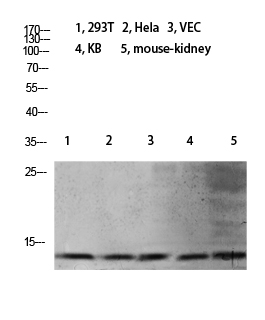Histone H4 (Mono Methyl Lys21) Polyclonal Antibody
- Catalog No.:YH0011
- Applications:WB;ELISA
- Reactivity:Human;Rat;Mouse
- Target:
- Histone H4
- Fields:
- >>Neutrophil extracellular trap formation;>>Alcoholism;>>Viral carcinogenesis;>>Systemic lupus erythematosus
- Gene Name:
- HIST1H4A H4/A H4FA; HIST1H4B H4/I H4FI; HIST1H4C H4/G H4FG; HIST1H4D H4/B H4FB; HIST1H4E H4/J H4FJ; HIST1H4F H4/C H4FC; HIST1H4H H4/H H4FH; HIST1H4I H4/M H4FM; HIST1H4J H4/E H4FE; HIST1H4K H4/D H4FD; HIST1H4L H4/K H4FK; HIST2H4A H4/N H4F2 H4FN HIST2H4; HIST2H4B H4/O H4FO; HIST4H4
- Protein Name:
- Histone H4
- Human Gene Id:
- 121504
- Human Swiss Prot No:
- P62805
- Mouse Swiss Prot No:
- P62806
- Rat Swiss Prot No:
- P62804
- Immunogen:
- Synthetic Mono-Methyl peptide from human protein at AA range: 21
- Specificity:
- The antibody detects endogenous Mono-Methyl-Histone H4 (K21)
- Formulation:
- Liquid in PBS containing 50% glycerol, 0.5% BSA and 0.02% sodium azide.
- Source:
- Polyclonal, Rabbit,IgG
- Dilution:
- WB 1:500-2000, ELISA 1:10000-20000
- Purification:
- The antibody was affinity-purified from rabbit antiserum by affinity-chromatography using epitope-specific immunogen.
- Concentration:
- 1 mg/ml
- Storage Stability:
- -15°C to -25°C/1 year(Do not lower than -25°C)
- Other Name:
- H4K21ME1;HIST1H4A;H4/A;H4FA;HIST1H4B;H4/I;H4FI;HIST1H4C;H4/G;H4FG;HIST1H4D;H4/B;H4FB;HIST1H4E;H4/J;H4FJ;HIST1H4F;H4/C;H4FC;HIST1H4H;H4/H;H4FH;HIST1H4I;H4/M;H4FM;HIST1H4J;H4/E;H4FE;HIST1H4K;H4/D;H4FD;HIST1H4L;H4/K;H4FK;HIST2H4A;H4/N;H4F2;H4FN;HIST2H4;HIST2H4B;H4/O;H4FO;HIST4H4;Histone H4
- Observed Band(KD):
- 11kD
- Background:
- Histones are basic nuclear proteins that are responsible for the nucleosome structure of the chromosomal fiber in eukaryotes. Two molecules of each of the four core histones (H2A, H2B, H3, and H4) form an octamer, around which approximately 146 bp of DNA is wrapped in repeating units, called nucleosomes. The linker histone, H1, interacts with linker DNA between nucleosomes and functions in the compaction of chromatin into higher order structures. This gene is intronless and encodes a replication-dependent histone that is a member of the histone H4 family. Transcripts from this gene lack polyA tails but instead contain a palindromic termination element. This gene is found in the histone microcluster on chromosome 6p21.33. [provided by RefSeq, Aug 2015],
- Function:
- function:Core component of nucleosome. Nucleosomes wrap and compact DNA into chromatin, limiting DNA accessibility to the cellular machineries which require DNA as a template. Histones thereby play a central role in transcription regulation, DNA repair, DNA replication and chromosomal stability. DNA accessibility is regulated via a complex set of post-translational modifications of histones, also called histone code, and nucleosome remodeling.,PTM:Acetylation at Lys-6, Lys-9, Lys-13 and Lys-17 occurs in coding regions of the genome but not in heterochromatin.,PTM:Citrullination at Arg-4 by PADI4 impairs methylation.,PTM:Monomethylated, dimethylated or trimethylated at Lys-21. Monomethylation is performed by SET8. Trimethylation is performed by SUV420H1 and SUV420H2 and induces gene silencing.,PTM:Monomethylation at Arg-4 by PRMT1 favors acetylation at Lys-9 and Lys-13. Demethylation is p
- Subcellular Location:
- Nucleus. Chromosome.
- Expression:
- B-cell lymphoma,Bone marrow,Brain,Clones donated by HIP,Corpus call
- June 19-2018
- WESTERN IMMUNOBLOTTING PROTOCOL
- June 19-2018
- IMMUNOHISTOCHEMISTRY-PARAFFIN PROTOCOL
- June 19-2018
- IMMUNOFLUORESCENCE PROTOCOL
- September 08-2020
- FLOW-CYTOMEYRT-PROTOCOL
- May 20-2022
- Cell-Based ELISA│解您多样本WB检测之困扰
- July 13-2018
- CELL-BASED-ELISA-PROTOCOL-FOR-ACETYL-PROTEIN
- July 13-2018
- CELL-BASED-ELISA-PROTOCOL-FOR-PHOSPHO-PROTEIN
- July 13-2018
- Antibody-FAQs
- Products Images

- Western blot analysis of 3T3 mouse-kidney KB K562 Hela 293T lysate, antibody was diluted at 1000. Secondary antibody(catalog#:RS0002) was diluted at 1:20000



